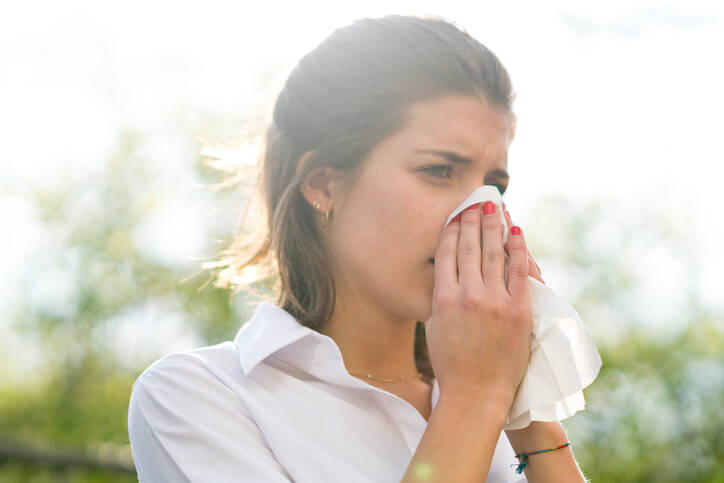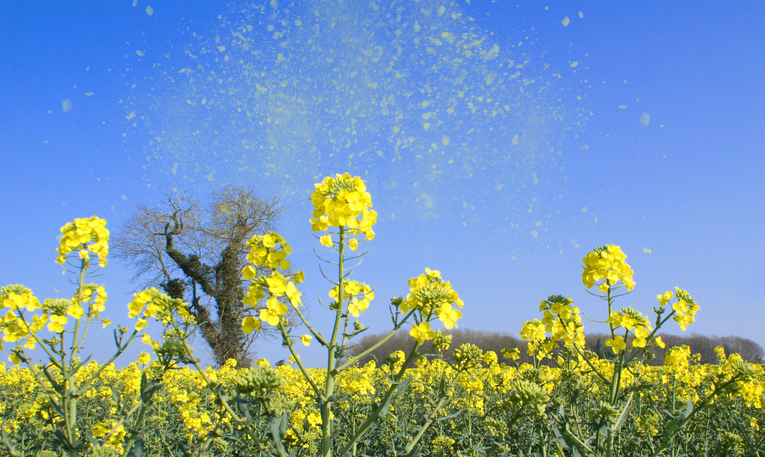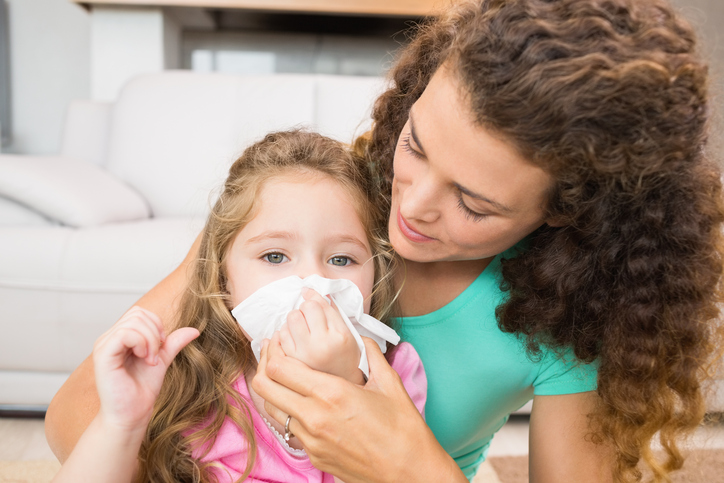Do you suffer from hay fever or allergic rhinitis?

Hay fever can make a person's life miserable. It is a disease of civilisation. It interferes with quality of life. If not optimally treated, it often progresses to bronchial asthma. Therefore, its diagnosis and therapy deserve attention. Avoid home treatment and see a doctor.
Article content
Hay fever makes spring or summer days difficult for many people. It is a civilisation disease. It must be diagnosed early and treated adequately. Home recipes are not enough.
Allergic rhinitis - what is it and what causes it
Hay fever is a synonym for allergic rhinitis or pollinosis. It is one of the examples of common and mild allergy. It is actually an allergic disease of the respiratory tract caused by pollen.
It is believed that more than 30% of the world's population, of all ages, suffer from this disease.
It is triggered by allergens that affect us from the external environment. An allergen is a substance that causes an allergic reaction in the body. The trigger is an exaggerated response of the body to their presence.
A large part of the population suffers from hay fever symptoms when exposed to pollen found in the air. However, other allergens can also be a trigger.
Various allergens that trigger an exaggerated reaction:
- dust mites
- moulds
- fungi
- animals
- food
- medicines
- and the aforementioned pollen
An allergic reaction is an exaggerated reaction of our body's immune system to antigens (antibody-producing substances). These are commonly present in our environment.
It is caused by the incorrect activation of immunoglobulin E (IgE) antibodies by the allergen in question. The spectrum of allergic reactions is wide, ranging from the common cold to anaphylactic shock, which can be fatal.
Read also: article on anaphylactic shock.
It is caused by an allergic inflammation that affects the mucous membrane of the upper respiratory tract, causing obstruction or blockage of the nose and secretion of mucus.
The main role is played by vasodilatation - the dilation of blood vessels under the mucosa, from where the signal to damage the epithelium is conducted. Thus, the mucosal surface through the trigeminal nerve to the cerebral cortex, triggering a complex response to irritation of the nasal mucosa.
This consists of itching and sneezing. Then there's secretion - nasal discharge.
Let's look at all the summer problems together:
Our health in summer - sun, heat, injuries and illnesses
Symptoms of allergic rhinitis
Most sufferers have seasonal rhinitis, but the symptoms are also year-round. In about a third of cases, asthma is also present. In rare cases, asthma is predominant.
In about 90% of seasonal asthmatics, allergic rhinitis is also found. In contrast, asthma without rhinitis is almost non-existent in polyneuropathic asthmatics (people with hay fever, pollinosis).
Hay fever is most common between the ages of 10 and 40.
Allergic rhinitis is accompanied by typical symptoms such as itchy, stuffy nose, runny nose and sneezing. In a few cases, it is also accompanied by symptoms from the surrounding organs - such as pharyngitis, otitis media or conjunctivitis. However, if you have never had allergies before, the symptoms of hay fever cannot be correctly identified at first.

These symptoms may point to the fact that you have hay fever:
- inflammation of the nasal mucosa
- associated with a runny nose
- stuffy nose
- itchy and watery eyes
- redness of the eyes
- swelling of the eyelids
- sneezing, intense sneezing lasting several minutes is common
- coughing
- constriction of the trachea or bronchi associated with shortness of breath and wheezing when breathing
- eczema, rash and other skin manifestations
- general weakness and fatigue
Irritating scratching in the throat and ears and an unpleasant cough are common. About a third of patients suffer from oral allergy syndrome, characterised by itching or burning of the mucous membranes of the mouth or lips after eating certain fruits or vegetables.
Untreated hay fever has a significant impact on the quality of life of the affected person. It is triggered reflexively. Frequent and intense sneezing cannot be stopped at all. The subsequent nasal discharge or itchy eyes have a significant negative impact on any activity.
A stuffy nose makes it difficult to breathe even during sleep. The person is often sleep-deprived and his or her psychological state is adversely affected.
Do you suffer from seasonal or year-round colds?
Allergic rhinitis is divided into seasonal and perennial rhinitis, depending on the triggering allergens and the prevailing incidence. However, the division into intermittent (transient) and persistent is currently used in view of the therapeutic strategy.
If the rhinitis occurs only sporadically, i.e. not every day, if the patient always has symptoms for several days and has several days without difficulty, it is termed intermittent.
Rhinitis in which the symptoms persist every day is called persistent. Rhinitis that occurs more than 4 days a week and lasts more than about 4 weeks is considered persistent.
Both have different intensities of symptoms. Therefore, they are divided into mild (not bothersome) and severe (bothersome). The forms of allergic rhinitis, together with their intensity, are not constant. Therefore, the transition from one form to the other is possible at any time.
Seasonal rhinitis should not be confused with intermittent rhinitis or perennial rhinitis with persistent rhinitis. The two divisions are not mutually exclusive. For example, seasonal rhinitis can also be transient or persistent. The disease is often linked to a particular season, but persistence of allergic mucosal inflammation is confirmed even weeks after contact with the allergen.
The table below shows the classification of rhinitis according to the 2010 revision of the guidelines
Intermittent
|
Persistent
|
Moderate
|
Moderate to severe
|
Impact on other illnesses
A separate chapter is the effect of hay fever on other allergic diseases, especially bronchial asthma. Children with chronic asthma and allergic rhinitis have half as many hospital admissions for asthma exacerbations as young asthma patients without allergic rhinitis.

Early and effective treatment reduces this number by up to almost 80%. Allergic rhinitis has been confirmed to be an independent risk factor for bronchial asthma, up to 3.5 times higher than in patients without rhinitis.
Surprisingly, atopic patients without rhinitis do not show an increase in the risk of asthma, but instead show a nearly 3-fold increase in relative risk in the presence of non-allergic rhinitis. Therefore, rhinitis is considered an independent risk factor for asthma.
Atopy is a hereditary tendency to allergy and therefore has a familial occurrence. Typical manifestations are atopic eczema (atopic dermatitis), pollen allergy (allergic rhinitis and allergic conjunctivitis and allergic asthma). Atopy sufferers have an innate ability to produce increased amounts of IgE class antibodies. These antibodies react to allergens in the external environment (pollen, mould, dust mites).
Treatment of allergic rhinitis
Due to the interaction between the upper and lower airways in humans, approximately 80 % of patients with asthma also have rhinitis and 10 to 40 % of patients with rhinitis also have asthma. Therefore, there is a need for targeted testing for asthma when rhinitis is present and vice versa.
The aim of treatment is to identify the allergen, determine the degree of airway involvement and the intensity of local complications. Several specialist physicians should be involved, such as an immunologist-allergist, a pulmonologist and an otorhinolaryngologist.
Identification of the allergen is crucial in terms of determining the risk.
Allergy sufferers often self-prescribe nasal decongestant drops, but after the initial relief after a few minutes, it's all over. Their frequent use worsens nasal congestion over time and leads to addiction.
This condition is called medicated rhinitis - it is caused by the frequent use of medications that reduce the blood supply to the lining of the nose. These medications should only be used during non-allergic rhinitis. If you have an allergy, regular drops should not be used at all.
Allergic rhinitis should be treated with medications designed for this purpose, so if you have difficulty, you should see a doctor. It is an allergy and if left untreated, you will become sensitive to more and more allergens.
So a cold that used to bother him only seasonally becomes a year-round problem.
Since hay fever is caused by contact with allergens, it is good to avoid them. It is therefore necessary to know what allergen triggers it.
If you suffer from allergic rhinitis, it is a good idea to follow these guidelines:
- during the pollen season, limit ventilation.
- so that many allergens don't enter the home and cause problems
- wearing sunglasses is recommended
- to reduce the risk of direct eye contact with pollen
- this will increase the chances of preventing swelling, itching or pain
- it is advisable to shower more often
- to wash allergenic substances from the body
- reduce smoking or stop smoking altogether
For the pharmacological treatment of rhinitis, antihistamines are used and are indicated for all forms of allergic rhinitis. Their modern form is cardiologically safe and has anti-allergic and anti-inflammatory effects. Long-term preventive application of antihistamines is very effective. Their administration only at the onset of the disease is less effective.
The inflammatory reaction of the nasal mucosa is best suppressed by intranasal corticosteroids. Their effect is complex. They are needed especially in obturation - blockage of the nose by swelling of its mucosa.
Auxiliary pharmaceuticals such as nasal oil containing plant essential oils and vitamins A and E, mineral water in spray form and sea water solutions are also used.
It is recommended to apply them before the administration of antihistamines and corticosteroids - by cleansing the mucous membrane, they help their better effectiveness.
Allergen immunotherapy is the only treatment aimed at the cause of the disease interfering with its natural development. Its use is considered wherever a causative allergen has been demonstrated. It does not replace pharmacotherapy, but gradually reduces it.
Its greatest strength lies in prevention. It prevents the development of new sensitisations and prevents the development of allergic disease.
Most countries in Europe have a pollen information service that monitors the pollen content of the air.
Video about allergic rhinitis
Related










